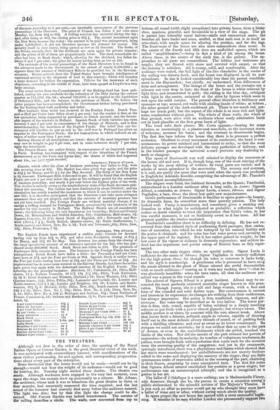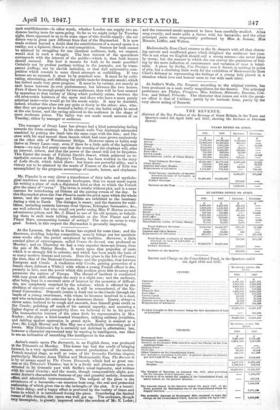THE THEATRES.
Although not first in the order of time, the opening of the Royal Italian Opera at Covent Garden is the great theatrical event of the week. It was anticipated with extraordinary interest, with manifestations of the most violent partisanship, for and against, and corresponding prognostica- tions about every part of the enterprise. Some foreboded that the house would not be ready—would not be big enough—would not bear the weight of its audience—would not be good for hearing, &c. Tuesday night settled those doubts. The theatre was ready. Although workmen were engaged to the very last moment, even upon the stage, the curtain drew up punctually to a minute. Mr. Albano, the architect, whose task it was to transform the great theatre in three or four months, had accurately measured the time required; and the last sound of the hammer had scarcely died away before the audience entered. The light was dim; but by that dim light the change could be dis- cerned. Old Covent Garden was indeed transformed. The cornice of the ceiling describes a circle. The walls, now converted from top to
bottom all round (with alight exceptions) into private boxes, form a horse- shoe, spacious, graceful, and favourable to a view of the stage. The pit is parted into tolerably equal halves—stalls and unreserved seats; the
benches all have backs and arms, stuffed, so that each seat is in itself an arm-chair, with ample space for altering the position, and for the legs.
The front-seats of the boxes are also more commodious than usuaL In the centre of the fourth and fifth tiers are undivided spaces, which are called " amphitheatres,"—being in fact a kind of pit among the boxes.
Above these' in the centre of the sixth tier, is the gallery. The ap-
proaches to all parts are commodious. The lobbies and staircases are ample; they are floored with stone and covered with carpet, so that the footstep is noiseless. All is roomy, solid, and comfortable. After the audience were seated, the full light of the fine chandelier in the centre of the ceiling was thrown forth, and the house was displayed in all its new splendours. In size it looked considerably less than the parent establish- ment in the Haymarket; but chiefly, we understand, from differences of form and arrangement. The linings of the boxes and the curtains are a crimson not very deep in tint; the front of the boxes is white relieved by light blue, and ornamented in gold; the ceiling is the blue sky, refulgent with light in the centre, animated at the sides by figures which seem to rest upon the solid cornice. The general effect therefore is brilliancy and openness at top; around, red walls with circling bands of white; at bottom, the sober ground of the dark-cushioned pit. There is too much red, per-
haps too much gold; but the aspect of the whole is at once rich and light- s-me, reselendent without glare. The whole of those walls, the whole of that ground, were alive with an audience whose ready admiration bunt out in loud plaudits at the first great burst of light.
The band take their places: Mr. Costa appears,—bowing for some minutes, as unceasingly as a plaster-cast mandarin, to the incessant storm of welcome; assumes his baton-' and the overture to Semirarnicle begins. The first few bars inform the house that there is in presence a perfect orchestra. Obedient to every movement of its conductor, the band is con- sentaneous; its power subdued and harmonized to unity, so that the most delicate passages are developed with the very perfection of delivery, and in the loudest passages the universal accord prevents any deafening tu mnit or clangour.
The opera of Semiramids was well selected to display the resources of the house, old and new. It is, though long, one of the most stirring of the works by the most stirring of writers; its vocal parts are varied; and it admits of much splendour in the accessories. The scenery and costume, it is said, are partly-the same that were used when the opera was produced in English for Adelaide Kemble, comprising the advantage of Mr. Planches archteological accomplishments.
The singers were Grisi, the habitual favourite, as the Queen; Tamlirini, reintroduced to a London audience after a long exile as Assur; Signora Alboni a contralto, as Areace; Signor Levis, a tenor, and Signor Tagliakeo, a bass, Oroe; the three last quite new acquaintances.
Grisi's performance of Semiramide is familiar to opera-goers—its beauty, its dramatic force, its somewhat more than queenly passion. The lady looked well. Fancy is treacherous, and sometimes gives a seeming con - firmation to what might be anticipated as probable; a reflection which makes us doubt whether to trust the impression that Grisi's voice, in her less careful moments, is not so faultlessly sweet as it has been. All her greatest qualities she retains unabated.
Tamburini's condition there is no difficulty in defining. He has not re- covered from that vitiated style of performing florid passages, that carica- ture of execution, into which he was betrayed by his natural facility and the praise it obtained; and his voice has lost some power and certainty in the upper part of its register. But it has rather gained in weight; he has lost none of his vigour or delicacy in dramatic expression; and seldom in- deed has the impetuous and potent satrap of Rossini been so fitly repre- sented.
The two other male singers claim no special notice. Signor Lavia is sufficient for the music of Idreno; Signor Tagliafico is scarcely sufficient for the high priest, Oroe; for though his voice is sonorous it lacks body, and his style is nondescript. A gentleman who is presumed to have sung the music allotted to the ghost of Ninus uttered the awful denunciation with so much mildness—" roaring an it were any sucking dove "—that he was absolutely inaudible: when his turn came, all that the audience per- ceived was a pause in the vocal soands. The advent of Signora Alboni is a great incident. Alboni may be ac- counted the most perfectly endowed contralto singer known to this gene- ration. Though young, she is a tall and large woman, with a face and form of the rounded and solid Italian type. Her countenance is earnest and intense in its expression; its changes are striking from their suddenness, but always impressive. Her action is free, unaffected, vigorous, and pic- turesque. Her voice may be described as in two halves. The lower por- tion is firm, rich, round, capable of being subdued to a deeply touching softness or put forth with a power almost gigantic; but always sweet. The middle portion is at times, by contrast with the rest, almost weak. Above that bursts forth a falsetto, pellucid, ample in volume, capable of drawing itself out in the most delicate silvery threads of sound, or of gushing forth with a thrilling vibration; and ever as sweet as its lower counterpart. Its compass we could not acertain; for it was evident that no note in the part of Arsace, or even in the embellishments which she added, touched the limits of the voice. Nor did the morale of the part exhaust her powers of expression—its ardour, its audacity, its touches of voluptuous tenderness, its pathos, were brought forth with a perfection that made each for the moment seem the crowning quality of the songstress; and yet in the ornaments, sparingly introduced, there was a playfulness and fitness which showed that her stores were unexhansted: her embellishments are not merely fioriture added to the notes and displaying the mastery of the singer; they are little spontaneous traits of expression added to the meaning of the part, charming in their Ateese, surprising by some unexpected turn. The first few notes that Signora Alboni uttered established her position as a great singer; her performenee WAS an uninterrupted triumph; and she is recognized as a genius in her art. The ballet Of L'Ociali.tque is a mere nothing; nor is Mademoiselle Fleury, nith danseuse though she be, the person to create a sensation among a priblic ifceinitoined to the splendid artistes of Her Majesty's Theatre. It is just such an affair as persons would get up who thought they must have a ballet of some sort or other, without caring much about the quality.
In opera proper, the new house has opened with a most successful begin- ning. It remains to be seen whether London can permanently support two
such establishments-in other words, whether London can supply two au- diences having taste for opera-going. So far as we might judge by Tuesday night, there appeared to us to be some signs of this double supply: the au- dience was in great part different from that of the Haymarket. It is now made evident beyond a doubt that the establishment of a second opera is a reality, not a figment; there is a real competition. Success for both cannot be attained by struggling for one identical audience; both, we suspect, would sink in such a struggle. The best interest of the speculators corresponds with the interest of the public-which is, that both houses should succeed. But how is success for both to be made possible? Certainly not by profuse partisan writing in the journals; not by trans- parent pulling; not by slavish imitation, or that dull uninventive com- petition which consists in mere direct attempts at outbidding. If two houses are to succeed, it must be by practical acts. It must be by culti- vating, stimulating, and diffusing the public taste for dramatic music; which has indeed made very great progress. It must be by variety, not merely at each house between its own performances, but between the two houses. Even if there be enough people for two audiences, they will be best secured by appealing to that variety of liking which probably exists, between the old aristocratic habitues of the opera and those who have a more purely artistieal taste-who would go for the music solely. It may be doubtful, indeed, whether this class can pay quite so freely as the other; also, whe- ther they are prepared to demands ballet: if not, the ballet might be saved at the one house, and the saving allowed to the audience in the shape of more moderate prices. The ballet was not made much account of on Tuesday, either by manager or audience.



























 Previous page
Previous page